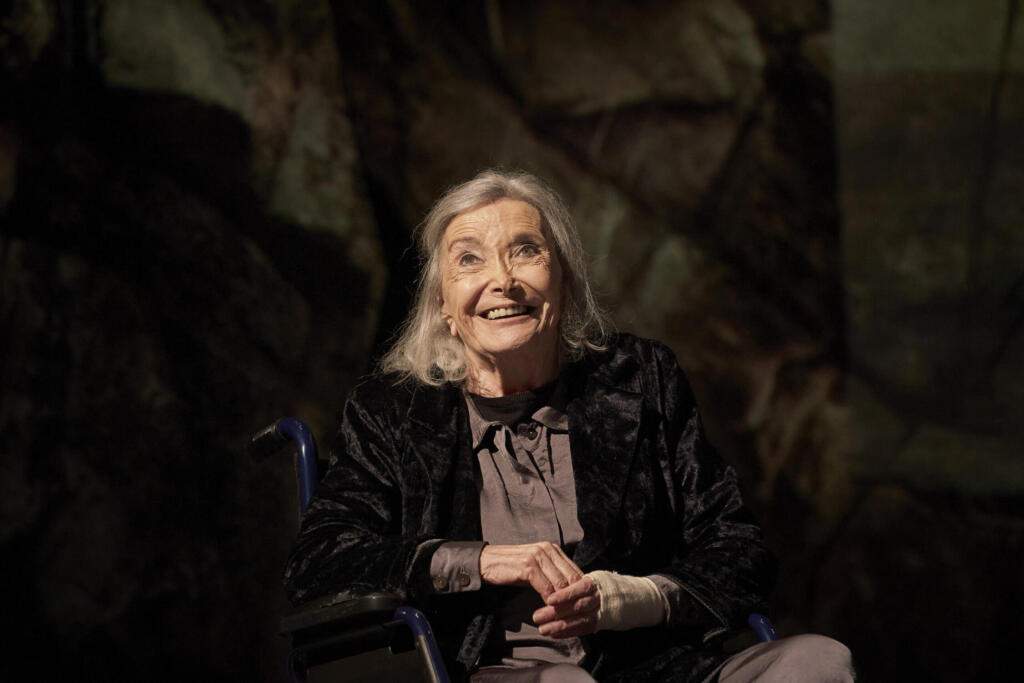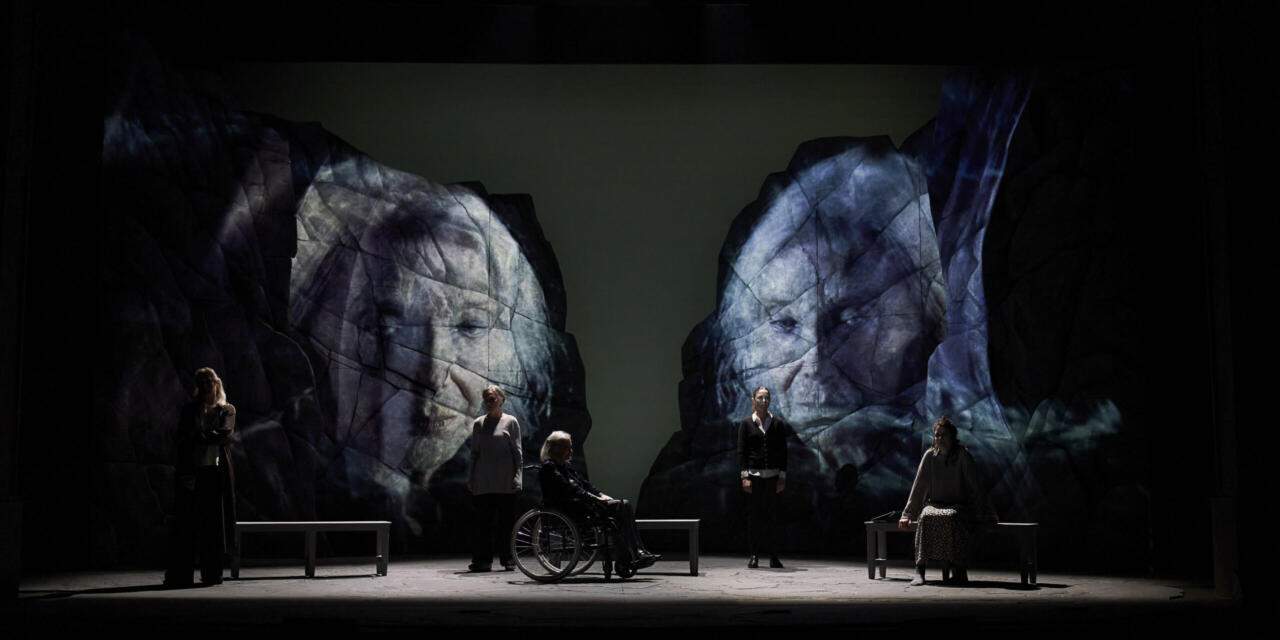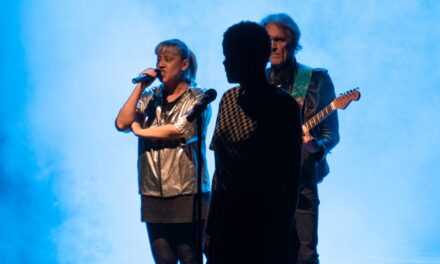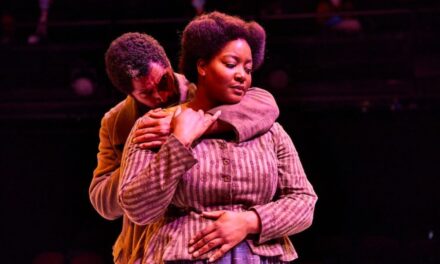Alejandro Palomas has transformed his acclaimed 2005 novel La isla del aire (The Island of Air) into a play. The textured novel weaving together the voices of three generations of women dealing with loss is here presented through the bare bones of its narrative: 90-year-old matriarch Mencía is staying with her daughter Lía on the island of Menorca while her younger daughter Flavía, with whom she usually resides, is nursing a broken leg. Only the two women are not alone: Bea, Lía’s daughter, is visiting, recovering from shingles; and Inés, Lía’s younger daughter also arrives unannounced. A third daughter, Elena, disappeared at sea but is repeatedly evoked and referenced. Mencía decides that Flavía needs to join them so that the five family members can journey to the nearby Island of Air from which the play takes its title. The final scene brings the five women together on this mythical island where after difficult confrontations, they try to secure a degree of closure as a way of moving on.
This is very much Mencía’s play; she dominates pretty much every scene and eighty-seven-year-old Nuria Espert excels as the feisty, opinionated matriarch. She is in a wheelchair when the audience first see her, a frail white-haired figure wrapped up against the risk of a chill. Appearances can be deceptive, however, for the wily Mencía is determined to get a few home truths out of her sluggish granddaughter Bea (Miranda Gas) who is more interested in crouching over her laptop than confiding in her grandmother. Mencía knows something is up and keeps probing as to why Bea’s husband Arturo isn’t at her side when she has shingles. At first, Mencía asks questions very directly, demonstrating disdain for Bea’s ‘travelling for work’ excuses for Arturo. Bea purports to be writing but Mencía doesn’t believe her; it’s a distraction so Bea doesn’t have to deal with the loss that’s eating away at her. Mencía’s game of secrets – where each woman confesses a secret to each other – lures Bea into revealing the terrible truth that Arturo has left her. There is no other woman, no torrid affair; he would rather be alone than remain with her a moment longer. His abandonment has left Bea bereft.
La isla del aire is filled with secrets and lies that tumble over one another in quick succession. There’s a toxicity between Flavía and Mencía that hovers over the proceedings from the beginning – the reason is revealed at the end of the play. In addition, Lía had a less than satisfactory marriage to womanising Martín whom she tried to leave only to be encouraged by her mother to go back home before Martín realised that she had left. Vicky Peña’s Lía is emotionally absent, unable to acknowledge the overwhelming grief that Elena’s death has generated. She dutifully and calmly attends to Mencía but there is a vacuum in her eyes, a dullness that hangs over all that she does; it is as if she is moving through a rota of actions and refusing to ask questions of her mother or daughters for fear of what may emerge. It is a curiously flat performance from Peña but that may be a consequence of the writing; this is a role where agency is minimal and Lia over describes her emotional state to the audience through the largely stationary monologues.
Inés and Flavía also have their own secrets. Inés (Candela Serrat) wants to leave her husband Jorge for her secret lover Olivia. Lía is less than sympathetic, urging Inés to go back to her husband – just as she had done when in a similar situation decades beforehand. Only Jorge finds Inés’s letters to Olivia and threatens her with loss of access to her son. Flavía (Teresa Vallicrosa) is married to Héctor but pines for her former boyfriend Cristián who returned to his native Argentina soon after the military coup in 1976. On his arrival, he was subsequently detained and killed, leaving Flavía paralysed with grief. Like her sister Lía, she is a shadowy figure. Only while Lía floats like a ghost in her flowing jacket, Flavía struggles to move across the stage with her cumbersome crutches. Each presents a very different vision of withdrawal. Flavía is emotionally dependent on Mencía and hates herself for it. Self-loathing here merges with hate for a mother who she knows arranged to have the love of her life arrested.
There are a lot of revelations in the play which tip the action into a form of melodrama: Inés conceived on the night Lía returned to her husband; Flavía’s father confessing prior to his death that Mencía had intervened to have Cristián “disappeared’ because she didn’t think he was good enough for her daughter; Jorge finding Olivia’s letters to Inés. The play groans under the weight of them all. Moreover, the literary qualities of the novel that proved so persuasive on the page generate a rhythm where the dramatic is jettisoned to the poetic. Information comes through monologues and duologues that give the play a rather static quality that Mario Gas’s languid production sometimes struggles to address.

Nuria Espert in La isla del aire Photo: David Ruano
La isla del aire is, however, worth seeing for Espert’s outstanding performance on the stage of the Romea where she first auditioned 74 years earlier. Mencía has the play’s best lines and Espert delivers them with impeccable timing. Whether it’s delighting in confiding to Bea that she has urinated in her pants or weaponizing language to wound her daughters, she controls the onstage action with a veritable sense of comic timing. Mencía is at once a terrible and compassionate figure. She strides ahead with a walking stick, leading the family party with a keen sense of purpose as they arrive on the Island of Air. Clad in the fur coat that she has demanded Flavía bring for her, she cuts a clown-like figure with her determined facial expressions. She moves her wiry hands like butterflies to capture her granddaughter’s attention and delivers home truths with the brazen outspokenness and wit that Chus Lampreave brought to Almodóvar’s memorable meddling mothers.
In her wheelchair-cum-throne, Mencía holds court, expecting her daughters and granddaughters to step into line. Self-knowledge – she knows she has never had good taste in men and wishes her daughters and granddaughters could admit the same failing as a way of explaining their floundering relationships— is not, however. matched by self-doubt. She displays no shame for what she did to Cristián – justifying her appalling and misguided act as a way of protecting Flavía. There are echoes of her memorable King Lear (2015) as her memory fails her; her bitter remarks recall her chilling Martha in Who’s Afraid of Virginia Woolf (1999); words of wisdom to family members reference her memorable grandmother Nazira, mother Jihane, and daughter Nawal in Gas’s memorable production of Wadji Mouawad’s Scorched (Incendios) in 2016. She wears the history of her former roles in a rich and playful manner. To watch Nuria Espert on stage is to witness a unique journey through Spanish theatre over the past 70 years.
And that journey is not yet over for while the voice may not be quite as round as I remember when I last saw her in Romancero gitano (Gypsy Ballads) in 2019, the tenacity and verve are all still in evidence. Her Mencía spits out her words like bullets when she informs Flavía she doesn’t regret a thing. Her head and neck rise like a giraffe surveying the field when she reprimands her daughters. There are moments when she stops, forgetting where she is or who is front of her as dementia knocks at her door, but then she recovers her composure and her acid tongue kicks back in to put her once again firmly in the driving seat. “Your grandmother is a stock,” says Mencía to Bea, a Spanish colloquialism that acknowledges a slippery, watery memory. There is a seductive quality to her tone as she plays secrets with Bea; a more dismissive register comes into play with Inés. She cackles with defiance when Inés stands up to her. Mencia’s retorts have a terrifying candour and cruelty. At times, however, she looks so frail as she struggles to rise from her wheelchair that this infirmity inspires empathy. Indeed, Espert drives the action and lifts the play with a spirited and complex performance.
There is a lovely complicity to the relationship with Bea that emerges through the production: Miranda Gas’s Bea displaying a new confidence in the proximity – both physical and emotional – with her grandmother. The tableau at the production’s opening sees the five women on stage – at once together but also apart, looking out in different directions as if each is lost in their own world. Sebastià Brossa’s set of high perilous cliffs towers behind the actresses. Projections shimmer as the sounds of the sea echo in the distance: dismembered faces and hands point to peril at sea, perhaps images of the absent Elena as she met her end. Soundscapes and music are by Orestes Gas — son of Mario Gas and Vicky Peña, and brother of Miranda Gas — thus making La isla del aire very much a family affair. The cliffs move apart to let more light in as the action shifts to the Island of Air: the women can breathe more easily as the secrets spill out and Elena’s death at sea is finally acknowledged by Lía. The symbolism is perhaps overly laboured; it left me longing for the complex sense of danger that Gas brought to Scorched, but this is very different play by a writer just beginning his theatrical journey. La isla del aire runs at a clean 80 minutes and every one of those minutes is worth it just to see Espert give a masterclass in acting in what looks likely to be her final stage production.
La isla del aire runs at the Romea theatre Barcelona until 14 May and then tours across Spain.
This post was written by the author in their personal capacity.The opinions expressed in this article are the author’s own and do not reflect the view of The Theatre Times, their staff or collaborators.
This post was written by Maria Delgado.
The views expressed here belong to the author and do not necessarily reflect our views and opinions.


















